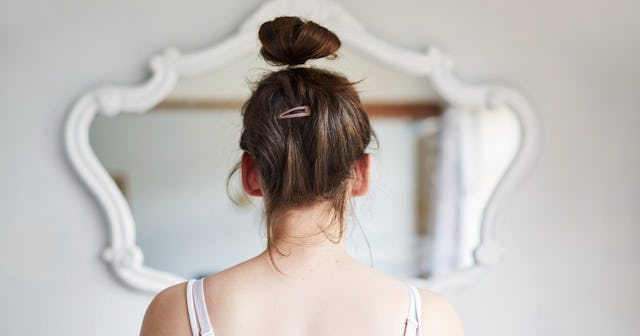New Study Determines That 'Slim-Thick' Ideal Is Ruining Girls' Body Image

New study indicates that the Kim Kardashian “slim-thick” body type is actually more harmful than the “ultra thin” era
When scrolling Instagram, you can’t help but get slammed with hyper-sexual images of absolutely retouched women. Thanks to the likes of Kim Kardashian, gone are the days of pining to be ultra thin. It spawned a new ideal that involved curves but only in the absolute right places. Stomachs are utterly flat while boobs, butts and thighs grew. Add a smattering of cellulite and viola! the idea of “slim-thick” was born.”
Researchers at York University in Toronto conducted a study about the pervasive images of the “slim-thick” ideal and the impact they are having on society. Apparently, it’s even worse for young women’s bodily satisfaction than the thin ideal.
“The thin-ideal has long been identified as a threat to women’s body image, and there’s been a call for body image campaigns and the media to showcase a greater diversity of body types,” researcher Sarah McComb tells Yahoo Canada. “However, even though the slim-thick body type touts a larger frame, it is not a healthier alternative to the thin-ideal for media consumers—it was actually more threatening to women’s body image.”
This “discovery” isn’t shocking, but it is extremely disheartening for a life-time fatty like myself.
There hasn’t been a moment of my life where I wasn’t fat. My chunky, rolly baby thighs grew into thunderous gams that have nary a gap to speak of. The first time I knew I was fat though, was at the tender age of 5. I vividly remember shopping for a bathing suit for a pool party with my mom at the local Clover. I excitedly spotted a yellow kid’s bikini with bright white daisies on them and knew I found the one. My mother however, totally disagreed. When I went to the party in the prison of a one-piece suit, I lamented about my mom and her irrational opposition to the cutest suit my 90s baby heart had ever seen to a friend.
This friend looked my dead in the eyes, as matter-of-factly as any toddler would and said:
“Oh that’s because you’re fat. You can’t wear one.”
Lauren Gordon
There was no malice in her voice, just a matter-of-fact statement she believed to be true. And honestly, deep down, my mother believed that too and was trying to shield me from the jeers of others. It was the beginning of an over two decades long journey to finding and maintaining self-love.
When I got to my 20’s and my pinky finger still wasn’t as skinny as some of these model’s waists, I started making peace with my body. Through Instagram I really fell into the world of “body positivity,” and began finding community and representation. There were people of all shapes and sizes getting loved on, and when they were ridiculed, commentators rushed to their defense.
But like all good things that live in late-stage capitalism, that movement took a turn. Instead of being a place for fat people to feel seen and be expressive, it morphed into a platform where averaged-sized women hunched over to show the one fat roll they are insecure about and getting called “brave.”
“Body Positivity” became a fad that everyone tried to capitalize off of, and did. Brands claimed to be more inclusive (spoiler: they weren’t). Movies included larger sized leads (but not like, too much bigger). Everyone sort of complimented themselves on being so super diverse when the truth is… they weren’t. It was barely more than pandering.
It’s evidently also had lasting effects.
There are a few theories that prostrate why this is, one of them being that the ideal appeals to women of all races and backgrounds. But of course, this isn’t a more attainable body type. The study noted that plastic surgeries or extreme, concentrated workouts is the only way it can be achieved.
The worst part for me? It feels like publicly we’ve all patted ourselves on the back for “fixing” the fat-phobia problem we so clearly still have. We went out of the frying pan and into the fryer. Until society accepts fat people, in particular fat women, we will not actually achieve body positivity. That’s not to disparage the progress we’ve made, but to remind people we cannot be complacent in this fight for representation. Our kid’s mental health literally depends on it.